

women live all around and among us, and we wish to share them with our readers every month. Cathy Bueti is one of them, and I learned a lot about her inner strength by reading her memoir. Cathy persevered beyond enormous losses. She refused to let anything get in the way of her goal to achieve the often-elusive happy ending.
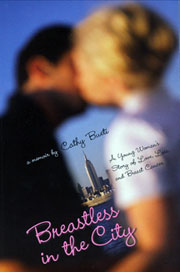
Cathy Bueti is a six-year cancer survivor, author, and occupational therapist. She was diagnosed with Stage II breast cancer in 2001 at thirty-one years of age, only seven years after being widowed when her husband was killed in a car accident. She underwent a mastectomy, reconstruction, and six months of chemotherapy. Cathy graduated from Misericordia University with a Bachelorís Degree in Occupational Therapy and has been working as an OT for many years.
In October, 2006, Cleveland Clinic Press published Cathyís first memoir, Breastless in the City: A Young Womanís Story of Love, Loss, and Breast Cancer. She hopes that through sharing her story she can inspire and give hope to other young people with cancer. Cathy has also become actively involved in The Iím Too Young For This Cancer Foundation for Young Adults (I2Y). Extremely passionate about I2Y, since it focuses on helping other young survivors get back to living after cancer, Cathy is committed to spreading the word. I2Y exists as an invaluable resource for young survivors.
~ ~ ~
WOW: Welcome to WOW! Cathy. Weíre honored that youíve decided to share your battle against breast cancer. Letís begin looking into your pre-cancer days. Could you describe your life with your first husband, Paul, and share your story?
Cathy: Thanks, I am excited and grateful for this opportunity to share my story with your readers. My story really starts in my childhood, growing up with a father who was an alcoholic. It was very difficult for all of my family getting through that tough time. I met Paul when we were in high school. I was fifteen and he was seventeen when we met. We were set up on a blind date and I was painfully shy back then! He was the football star and I was the girl with her nose in the books. We hit it off and became friends.
Paul became a huge support for me and the first person I confided in about my family issues. We dated on an off throughout high school and became serious when I was in college. We got married in 1992 when I was twenty-three. But not even two years later, on Labor Day, he was killed in a car accident along with his younger brother who was with him. So, there I was at twenty-five, a widow. It was surreal, and I was in such shock that I felt numb for a long time. I didnít know how I would survive without him in my life. But somehow we all find a way. Losing him was the greatest loss of my life.
|
"To be able to deal with the changes, the scars, and my fears, those were my greatest challenges..."
|
WOW: Itís heart-wrenching to hear your story about Paul. In your book, Breastless in the City, you mention Paul numerous times through entangled emotions--anger, grief, sorrow, loneliness. Do you think your loss instigated your unending drive, later on, to pursue dating?
Cathy: I always felt as though Paul was still a presence in my life after his death. I believe that those we love are never truly gone, and I believe our souls continue on. I have often felt his spirit many times over the years, especially when I faced my difficult times. I always knew someday I would find someone special again, somehow. Of course, I didnít know how long it would take!
I do believe that losing him was the reason I continued to pursue dating. I also believe that having had such a special person in my life, and knowing what it was like to be treated so special, made me look harder for what I wanted in another person. Knowing what I deserved, so to speak. I feel lucky for that.
WOW: What a wonderful way to view your worth, and what you deserve in life! Several years after his death, you endured another sudden blow to your lifeís plan. As an occupational therapist at the time of your cancer diagnosis, could you describe what went through your mind?
Cathy: I think that it was both good and bad. Being an OT made me a better advocate for myself as a patient, knowing the right questions to ask, knowing how the system worked. But I think that all of that medical knowledge running around in my head also affected me negatively, as I knew all too well what could go wrong! I knew what could go wrong during surgery, I knew how the hospital setting worked, how understaffed we were, and that made me very fearful of being on the other side of things as a patient.
WOW: I can imagine being on both sides of the hospital bed must be a tightrope walk for your mind. In terms of coping through writing, what motivated you the most as you wrote your memoir?
Cathy: What motivated me most was thinking of all the young adults out there going through cancer, trying to date and continue their lives as I did, and knowing that I could help them by sharing my story. I believe that it is part of the reason I have survived so well. I wanted to give back to others. Writing was a great way for me to do it. It also helped me to heal in the process.
WOW: Writing certainly heals! As I read your book, tears flowed on several occasions. You filled in my imaginationís attempt to understand what it would feel like to be you. Early on in your book, you state, "Healing my soul would be the hardest part of all." Could you elaborate?
Cathy: I think on some level I knew that although I would have scars and part of my body would be moved around and transplanted, those scars would heal. I knew somehow my body would heal. What I wasnít sure of was how I would heal emotionally and spiritually. I had suffered all my life with low self-esteem. Paul was the only light in my life and the only one who I felt truly loved me for who I was inside. Facing my surgery and all the scars and hair loss I would have to endure, I knew, would be difficult on my soul. I knew that my soul would take the biggest hit. To be able to deal with the changes, the scars, and my fears, those were my greatest challenges, and they still are today, sometimes.
WOW: That certainly makes sense. Youíve not only endured and coped, but youíve progressed to a point where you evolved in your career. You truly learned to identify with your cancer patients. Did this make it easier for you or harder?
Cathy: In some ways it made I harder to be an OT. I was now over-identifying with my patients, knowing what it was like to need help to dress, to walk, to do all the simple things we take for grantedóall of those things I help my own patients with every day. I am much more emotional now when I work with patients, especially those who have been diagnosed with cancer. On the other side of the coin, though, I think my experience has made me better at what I do, since I have been in their place and know all too well what it is like to struggle. I know what it is like to wait in the middle of the night for help to go to the bathroom and no one answers that call bell.
I truly think that unless you have been in someone elseís shoes there is no way you can understand what it is like. I think that if all healthcare workers had a patientís experience it would make them better at what they do every day. Of course, I donít wish that experience on anyone! Those who have had it can better help their patients.
WOW: Iím certain that through your awareness, you must be one of the best OTs around! Youíve probably touched many patientsí hearts and souls! On the other side, do any of your patients stand out in your mind as the ones who touched you the most?
Cathy: There are quite a few that I have never forgotten over the years, but one in particular definitely stands out as a "synchronicity moment" for me. I had just finished with my chemo, and my hair was finally growing back. One day, I had a note on my desk with the name of an outpatient who I was asked to see, just to help out that unit for a few days because they were short staffed. As I read the name, I stopped for a moment, recognized it, but couldnít quite place it. The diagnosis was a malignant brain tumor. The age of the patient was thirty-six.
So, off I went to the outpatient department to do my evaluation when it finally hit me that I knew the patient! He was a friend of mine back in high school who I had lost touch with over the years. Instantly, I became very nervous and told myself that it couldnít possibly be the same person. That was until I saw him standing right outside of the therapy room where I was heading to meet him. I stopped dead in my tracks. We looked at each other and I couldnít believe it was him. My long lost friend. He looked so different. Cancer had taken away so much.
He walked with a cane, had lost the use of one arm, lost his speech, and had a facial droop, all courtesy of the brain surgery to remove his tumor. He was accompanied by his sister who was taking care of him. He was no longer able to do things on his own. He had lost his independence. In that moment, I knew that we were meant to meet up again. It was no accident that I was assigned to do his evaluation that day. He recognized me, and I gave him a hug. Although he could no longer speak, his smile let me know he knew me. After I completed his evaluation I shared that I had just been through treatment for cancer. I stayed and talked with them, sharing my own experience, and I wanted to let him know that I could relate to some of what he was going through. I knew what it was like to be a young person with cancer.
A few months after that visit, I found out that he passed away. As I thought about him, sad that his life had ended, I felt grateful that our paths had crossed one last time so we could help each other. I really feel like it happened for a reason. I think that I provided him some comfort sharing what I had gone through and he reminded me how short life is once again. I still think about him from time to time and I included his name in the beginning of my book, alongside others, following "In memory of...," because he had earned a special place in my heart a long time ago.
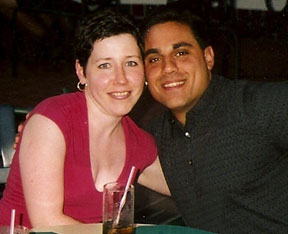
"I didnít realize that what also makes a woman sexy is who you are inside."
(Photo: Cathy & Lou)
WOW: Thanks for sharing that touching memory. Iím sorry to hear that he wasnít among your lot of success stories. Are many cancer patients as fortunate as you? What are the statistics for breast cancer patients, specifically?
Cathy: I try not to focus too much on statistics, but what I do know is that early detection is so important with any cancer. The problem, though, occurs when young adults go to the doctor with issues, or when a young woman finds a lump in her breast, she often hears, "Donít worry, youíre too young to have breast cancer...come back in six months and, if it is still there, we will check into it." So, the young woman exits, thinks she is okay, and then returns six months later. At that time, the doctor finally begins testing, only to find that, yes, it was cancer, but now it has advanced. At this point, she is diagnosed at later stages of the disease.
Younger women have a lower survival rate than older women, which may be due to detecting the disease at later stages. I always tell young women if they find a lump, get to a doctor and, if he says donít worry, come back to see another doctor and find someone who will listen and act upon it immediately. I also feel it is so important for young women to be proactive about their health.
WOW: I suppose that opens the wound of our current medical crisis in the U.S. Weíll leave that angle for another publication. Throughout your battle with cancer, you sought romance and love. I would think many women would close out the outer world, especially men. Did this help to distract you and keep your mind off of cancer somewhat?
Cathy: Yes, it did. I am often asked how and why did I keep looking for love through all of that. I have wondered that myself many times! My response has always been that I think I continued with it because it was a way for me to feel like I was still living. A diagnosis of cancer feels like an instant death sentence. I was just trying to hang on to all the things that made me feel normal. My job, my friends, and dating were big parts of my life. I wanted to still feel like I was doing the things I liked to do, and I think those things can be a distraction from the difficult things we may be going through at the time.
WOW: Your strength and focus amaze me the most. I think most people would have a tendency to curl up into a ball. I donít mean to jest here, but you even agree that you met some genuine losers through the online dating service. Looking back from where you are now, whatís the biggest reason you stayed with some of them?
Cathy: I can sum that up in one word: self-esteem! Wait, actually two words. Let me add "low" to that! I struggled with low self-esteem most of my life, stemming from my childhood and growing up with an alcoholic dad. When I returned to dating after I lost my husband, I stayed with a lot of losers back then. Of course, when I was losing my hair and my breast, my self-esteem plummeted to new lows! Often times, I stayed with the wrong guy.
But during my cancer treatment, it also became about finding someone who didnít care that I had cancer, was going bald and was boob-less. That worked against me, as well, because some of the men I dated had to deal with my new way of thinking once I had cancer: I was unlovable and I better hop on whatever broken down ship I could find in the harbor, so to speak! If a guy didnít mind I had cancer, then that became all I saw in him.
WOW: Iím sure thatís a common thread among many women diagnosed with cancer. At one point in your book, you wrote, "It was like I was stripped to the core somehow. Stripped of all the things that made me feel like a girl, the things that made me feel sexy." Would you say this was one of the challenging battles in your war against cancer?
Cathy: Yes, it definitely was one of the hardest parts of having cancer. With breast cancer, especially, so much has to do with your sexuality. Losing my breast, which is so connected to part of my sexual being, was really hard. As a woman, I always was fussing over my hair and never feeling like my boobs were big enough! I always felt like I would never be sexy enough for a man and then when I lost all of that, I really felt like it was hopeless. I didnít realize that what also makes a woman sexy is who you are inside. I found that you can still feel sexy without a breast; it can be a state of mind. But it took me a long time to get to that place!
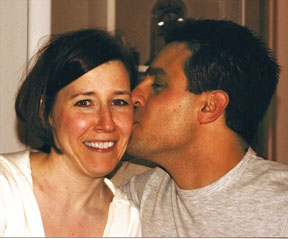
"Take the time to notice those little things that are right in front of you..."
(Photo: Cathy & Lou)
WOW: Certainly, all that matters is that you arrived at that new state of mind. What was the time frame from diagnosis to treatments to beating the cancer?
Cathy: I was diagnosed in May of 2001, had my mastectomy and reconstruction in August, and began chemo in October, which continued through the following April. After chemo, it takes a while before the body recovers after all that poison! So, it took about a year from my diagnosis, until I felt like I was getting back to myself. Then, I began a process of exploring what I could do to keep myself healthy. I changed many things about my diet and nutrition that I hadnít considered before. I feel much healthier now than before I had cancer.
WOW: Thatís wonderful. You describe the treatments as poison, because of the toxins. At one point, you sit watching TV while a chemical enters your veins. You wrote about it as a "surreal" time. Could you describe this for our readers?
Cathy: I remember sitting in the room for my first treatment looking around and seeing a TV and DVD player just above my recliner chair. I thought about how strange it was that these comforts, similar to home, were there among the syringes of red poison the nurse was about to shoot into my veins! I suppose it is somehow supposed to make a patient more comfortable, however possible that may be, though. It felt especially surreal to be sitting there watching TV while I was being poisoned. But that good olí hospital smell of sickness and plastic bandages jerked me back to reality! There were none of the nice smells from home which could have helped. I believe in aromatherapy and its ability to soothe and calm you.
WOW: Overall, it goes without saying, you were in search of the "Happy Ending." Your current husband, Lou, is a large part of that, beyond beating the cancer. Could you share your story with Lou?
Cathy: I like to also call it my "Happy Beginning!!" I met Lou at the end of my chemo treatments in March of 2002. We met online when I had just about given up hope of meeting anyone semi-normal with all the losers I had met up to that point! In our first conversation, I told him my story, and he shared with me that his mother had just passed away from breast cancer only a month prior to that time.
I felt so badly. I doubted that heíd want to meet me after having endured such a loss. But he did, and we had a first date shortly after. He was different from any other guys I had met. He was more mature and old fashioned. He was holding doors open for me, pulling out my chair, all the motions that seemed alien to me, except for when I was with my first husband.
Lou was able to see past all the scars and bald head to get to know me as a person. He was also very family oriented and the type of guy that would drop everything to help out a friend. He is a super special, amazing man! We were engaged six months after we met. We married the following year on the anniversary of my breast cancer diagnosis. I was able to replace a bad memory with a happy new one. This upcoming May will be our fifth anniversary!
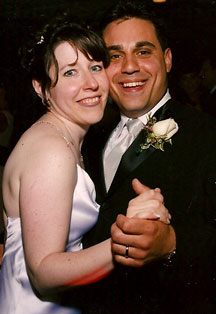
WOW: Congratulations on all of your positive changes, especially on the "Happy Beginning" with Lou! Would you like to leave our readers with any final bits of wisdom?
Cathy: I want to say that I feel it is important when we are challenged in life to make sure we still connect with ourselves. I learned this through losing my husband and then, when I got cancer. It was so important for me to tap into what made me tick, what made me happy, and to do the things I loved to do.
For me, that includes photography, writing, beading, or just spending hours in a bookstore getting lost in it. The ability to be creative helped me get away from the fear. So, I think that everyone--no matter what they are going through--needs to find what makes them creative and what feeds their soul. Those tools can really help when we are faced with stressful things. Fear can swallow us up so easily. I have also found much more pleasure these days in the simple things, such as spending time at home with my husband, watching a movie, walking with my dog. I never noticed those things before and was always out searching for something big to make me feel whole, when all I needed was right in front of me. Take the time to notice those little things that are right in front of you...
WOW: Cathy, you are true inspiration! Thanks for taking the time to share your ups, downs, and new views on life that help you succeed as a woman and a person.
Readers, Cathy was recently interviewed on CNN.com and, although she reveals many more details to us here at WOW!, youíll want to check out her video. Sheís a survivor and a gem! Stay healthy and happy, Cathy!
Readers, find out more about Cathy Bueti at her website: https://www.cathybueti.com
~ ~ ~
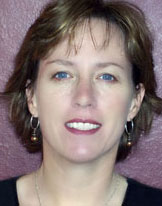
Bio: Sue Donckels
Although Sue thrived as a managing editor for WOW!, sheís moved onto her own business at www.inkbridge.com where she will place talented, emerging writers into internships with reputable online publications.
Take a stroll across InkBridge to see all it has to offer, beginning in February 2008.